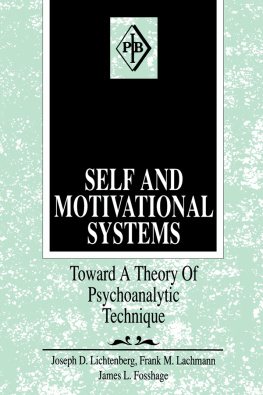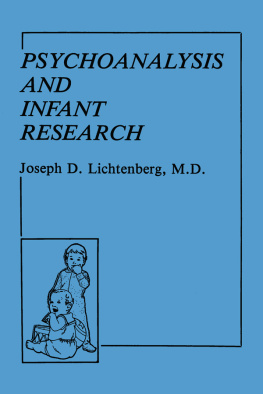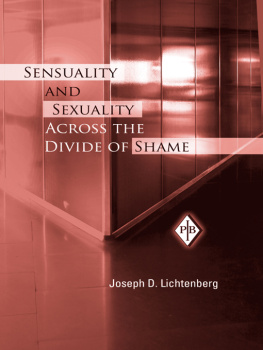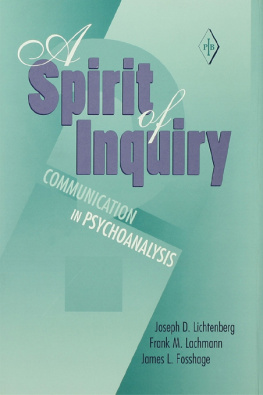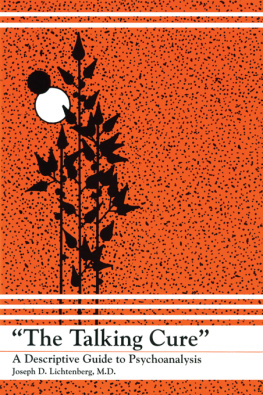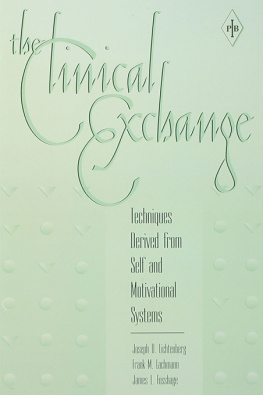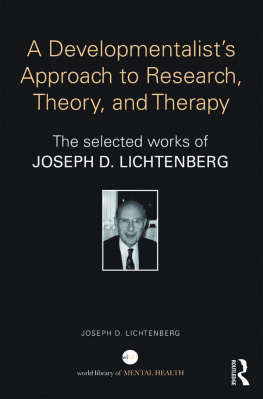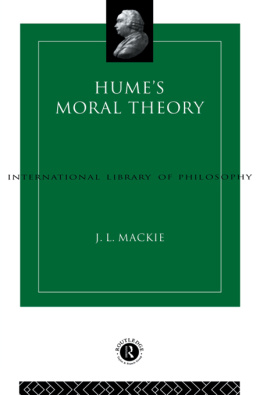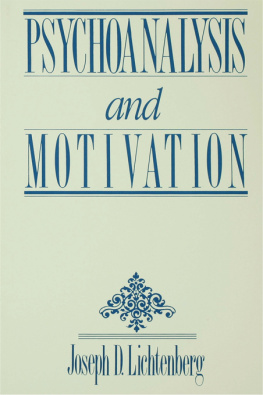Self and Motivational Systems
Toward a Theory of Psychoanalytic Technique
________________________________________
______________________________________
Psychoanalytic Inquiry Book Series
______________________________________
______________________________________
Volume 13
 | Psychoanalytic Inquiry Book Series |
Vol. 1: Reflections on Self PsychologyJoseph D. Lichtenberg & Samuel Kaplan (eds.)
Vol. 2: Psychoanalysis and Infant ResearchJoseph D. Lichtenberg
Vol. 4: Structures of Subjectivity: Explorations in Psychoanalytic PhenomenologyGeorge E. Atwood & Robert D. Stolorow
Vol. 5: Towards a Comprehensive Model for Schizophrenic Disorders: Psychoanalytic Essays in Memory of Ping-Nie Pao, M. D. David B. Feinsilver
Vol. 6 & 7: The Borderline Patient: Emerging Concepts in Diagnosis, Psychodynamics, and Treatment, 1 & 2James S. Grotstein, Marion F. Solomon, & Joan A. Lang (eds.)
Vol. 8: Psychoanalytic Treatment: An Intersubjective ApproachRobert D. Stolorow, Bernard Brandchaft, & George E. Atwood
Vol. 9: Female Homosexuality: Choice Without VolitionElaine V. Siegel
Vol. 10: Psychoanalysis and MotivationJoseph D. Lichtenberg
Vol. 11: Cancer Stories: Creativity and Self-RepairEsther Dreifuss-Kattan
Vol. 12: Contexts of Being: The Intersubjective Foundations of Psychological LifeRobert D. Stolorow & George E. Atwood
Vol. 13: Self and Motivational Systems: Toward a Theory of Psychoanalytic TechniqueJoseph D. Lichtenberg Frank M. Lachmann, & James L. Fosshage
Self and Motivational Systems
Toward a Theory of Psychoanalytic Technique
________________________________________
______________________________________
Joseph D. Lichtenberg
Frank M. Lachmann
James L. Fosshage
First published 2009 by Lawrence Erlbaum Associates, Inc., Publishers
Published 2016 by Routledge
2 Park Square, Milton Park, Abingdon, Oxon OX14 4RN
711 Third Avenue, New York, NY 10017
Routledge is an imprint of the Taylor & Francis Group, an informa business
All rights reserved. No part of this book may be reprinted or reproduced or utilised in any form or by any electronic, mechanical, or other means, now known or hereafter invented, including photocopying and recording, or in any information storage or retrieval system, without permission in writing from the publishers.
Notice:
Product or corporate names may be trademarks or registered trademarks, and are used only for identification and explanation without intent to infringe.
Credits and acknowledgments borrowed from other sources and reproduced, with permission, in this textbook appear on appropriate page within text.
ISBN: 9780881633597 (pbk)
Library of Congress Cataloging-in-Publication Data
Lichtenberg, Joseph D.
Self and motivational systems: toward a theory of psychoanalytic technique / Joseph D. Lichtenberg, Frank M Lachmann, James L. Fosshage.
p cm (Psychoanalytic inquiry book series, v. 13)
Includes bibliographical references and index
1. Motivation (Psychology) 2. Self. 3. Psychoanalysis
4. Psychotherapist and patient. I. Lachmann, Frank M. II. Fosshage, James III. Title IV. Series
[DNLM: I. Ego 2. Motivation 3. Psychoanalytic theory. Wl
PS427F v. 13 / WM 460.5M6L699s]
RC489.M655L533 1992
616.8917-dc20
DNLM/DI.C
| For Library of Congress | 92 4-414
CIP |
Contents
Self and Motivational Systems
Toward a Theory of Psychoanalytic Technique
________________________________________
______________________________________
We believe that the theory of the self and motivational systems calls for a revised theory of technique. Based on the concepts formulated in Psychoanalysis and Motivation (Lichtenberg, 1989a), this book provides a foundation for a psychoanalytic exploratory technique. Through clinical examples, we indicate the forms and methods of a technique based on self and motivational systems.
Reconsider briefly the theory offered in Psychoanalysis and Motivation. Psychoanalytic theory is, at its core, a theory of structured motivation. Five systems designed to promote the fulfillment and regulation of basic needs were delineated. Each system comprises distinct motivational and functional aspects. Each system is a psychological entity (with probable neurophysiological correlates). Each is built around a fundamental need. Each is based on behaviors clearly observable, beginning in the neonatal period. The five motivational systems are: (1) the need for psychic regulation of physiological requirements, (2) the need for attachment and later affiliation, (3) the need for exploration and assertion, (4) the need to react aversively through antagonism or withdrawal (or both), and (5) the need for sensual enjoyment and sexual excitement.
During infancy, each system contributes to self-regulation in mutually regulatory interactions with caregivers. At each period of life, the fundamental needs and the wishes, desires, aims, and goals that derive from those needs in each motivational system may be rearranged in different hierarchies indicated by different conscious and unconscious preferences, choices, and proclivities. From moment to moment, the activity of any one system may be intensified to the point where it provides motivational dominance of the self. The self develops as an independent center for initiating, organizing, and integrating motivation. The sense of self arises from experiencing that initiating, organizing, and integrating. Experiencing has an active (agent) and passive (receptor) mode.
Why do we need a new theory of motivation? Isnt the vitality of motivation guaranteed in the human by instincts or instinctual drives? [We] argue that motivations arise solely from lived experience. Based on the particular lived experience, motivations may or may not achieve optimal vitality. Whatever biophysiological urgencies and innate neurophysiological response patterns underlie psychological motivations, the vitality of the motivational experience will depend initially on the manner in which exchanges between infants and their caregivers unfold. Later, the development of symbolic representation enhances the potential for flexible, self-created reorganization of lived experience. A psychoanalytic theory of adaptive and maladaptive motivational functioning is about lived experience throughout life. Lived experience is about how we human beings consciously and unconsciously seek to fulfill our needs and desires by searching in potential events for affects that signal for us that experiential fulfillment [pp. 12].
The five motivational systems were derived from a host of empirical findings. They represent a way of clustering these findings so as to make sense from the vantage point of dynamic psychoanalysis. The five systems depict our vision of human motivation. We may ask, is that all there is to human motivation? Do these motivational systems capture the triumph of Liza Doolittle when she got it? Do they capture the agony of Richard Nixon when he lost it? Do they capture the ecstasy of an orgasm or the loneliness of the long distance runner? Our response is a modest yes, but we would quickly agree that when motivations are looked upon with a cold, empirical eye they may not pack the wallop of Freuds rider-on-the-horse metaphor.
Next page
